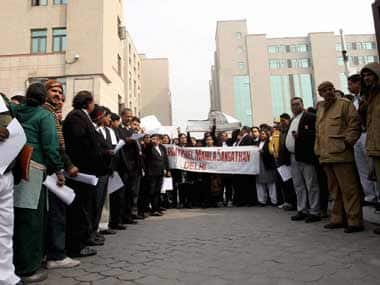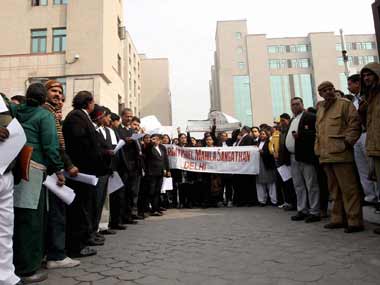Upholding a district court’s decision to restrict the media from covering the Delhi gang-rape case, the Saket District Judge on Wednesday dismissed the petition challenging an order invoking in camera (in private) proceedings in the case. Metropolitan Magistrate Namrita Aggarwal, had on Monday (7 January) granted the Delhi Police’s request to hear the rape case in-camera and restrict the media from reporting on the legal proceedings without permission of the court. The order was passed following commotion in the courtroom on a day when the five accused were to be produced in court. On the same day lawyers DK Mishra and Poonam Kaushik had challenged the order in response to which the District Judge had issued notice to the Delhi Police. [caption id=“attachment_582612” align=“alignleft” width=“380”]
 Protests by the lawyers in the courtroom had resulted in delay in the hearing on Monday. PTI[/caption] Dismissing the petition as being “devoid of substance”, the District Judge today said that the magistrate was “within her rights or rather duty-bound to apply 327 (2) (3) of the Criminal Procedure Code (CrPC).” Section 327 (2) (3) of the Cr PC prohibits the printing and publication of information relating to the legal proceedings without permission of the court. The District Judge said that he did not find “any error, impropriety or illegality” in the magistrate’s order applying in-camera proceedings in the gang-rape case. Referring to the next step in the legal procedure of the Delhi gang-rape case, the judge said, “The case is expected to be committed to a sessions court in the near future. The trial court would be required to regulate the proceedings in terms of Section 327 CrPC and pass necessary orders in that regard.” The petitioners, in what was close to a 40 minute-long argument of their case, sought the revoking of the magistrate’s order on the grounds that it was contrary to law and the facts. (Read full report
here
) Challenging the magistrate’s order line by line, Mishra told the District Judge that it was “ironic that nowhere in the description of the overcrowding in the courtroom had the presence of Delhi Police personnel or the CRPF personnel - who had occupied space on the dias with ‘dandas’ - been mentioned.” Mishra raised questions regarding the date on which the Delhi Police had filed its application requesting in-camera proceedings, suggesting that it was made prior to Monday’s commotion in the courtroom. Their petition blames the Delhi Police for ‘creating a situation in which they could succeed to gag the media as well as to get the proceedings conducted in secrecy.” Questioning the veracity of the lock-up in-charge’s report to the magistrate that he was unable to bring the accused into the courtroom for want of safe passage, Mishra told the judge that CCTV footage should be produced to show if any efforts were made at all to bring the accused to the courtroom in the first place.” The petitioner also vociferously argued against the description in the magistrate’s order of lawyers and members of the public who were present in the courtroom as being ‘not connected to the case’. “When the court is open everyone who is interested in the case is connected to the case,” Mishra argued. Arguing against in-camera proceedings in the Delhi gang-rape case, which he described as having “shaken the conscience of the nation”, he said only a ‘fair and transparent’ trial would ensure that any negligence on the part of the police or the hospital is exposed. Rejecting Mishra’s arguments questioning the facts in the magistrate’s order, the District Judge said: “The petitioner seeks to question the order on facts. This is not permissible as the judicial order is sacrosanct.” On Mishra’s legal argument that in-camera proceedings were not applicable to present circumstances as the case was neither in inquiry or at trial stage, the District Judge said: “The submission of the petitioner that 327 (2) of the CrPC could not be invoked because it is at the stage of committal is based on erroneous understanding of the statutory rule.” (Section 327 (2) of the Criminal Procedure Code refers to rule of in-camera proceedings in rape cases) The District Judge added: “Undoubtedly, the proceedings underway are not in the nature of trial. But committal proceedings are nothing but inquiry defined under Section 2 (g) of the CrPC.” On whether he would pursue the case in the High Court, Mishra said he would take a decision after going through the District Judge’s order in detail. The charge sheet in the gang-rape case, where 23-year-old student and her friend were brutally assaulted in moving bus on December 16, was filed on January 4. The gang-rape victim succumbed to injuries on 29 December. Five of the six accused have been charged with multiple offences including murder, attempt to murder, gang-rape, kidnapping, criminal conspiracy, dacoity, dacoity with murder and unnatural sexual offences. The sixth victim was identified by Delhi Police as a minor and will be tried by the juvenile justice board. The court took cognisance of the charge sheet on 5 January. The next hearing in the case is on 10 January.
Protests by the lawyers in the courtroom had resulted in delay in the hearing on Monday. PTI[/caption] Dismissing the petition as being “devoid of substance”, the District Judge today said that the magistrate was “within her rights or rather duty-bound to apply 327 (2) (3) of the Criminal Procedure Code (CrPC).” Section 327 (2) (3) of the Cr PC prohibits the printing and publication of information relating to the legal proceedings without permission of the court. The District Judge said that he did not find “any error, impropriety or illegality” in the magistrate’s order applying in-camera proceedings in the gang-rape case. Referring to the next step in the legal procedure of the Delhi gang-rape case, the judge said, “The case is expected to be committed to a sessions court in the near future. The trial court would be required to regulate the proceedings in terms of Section 327 CrPC and pass necessary orders in that regard.” The petitioners, in what was close to a 40 minute-long argument of their case, sought the revoking of the magistrate’s order on the grounds that it was contrary to law and the facts. (Read full report
here
) Challenging the magistrate’s order line by line, Mishra told the District Judge that it was “ironic that nowhere in the description of the overcrowding in the courtroom had the presence of Delhi Police personnel or the CRPF personnel - who had occupied space on the dias with ‘dandas’ - been mentioned.” Mishra raised questions regarding the date on which the Delhi Police had filed its application requesting in-camera proceedings, suggesting that it was made prior to Monday’s commotion in the courtroom. Their petition blames the Delhi Police for ‘creating a situation in which they could succeed to gag the media as well as to get the proceedings conducted in secrecy.” Questioning the veracity of the lock-up in-charge’s report to the magistrate that he was unable to bring the accused into the courtroom for want of safe passage, Mishra told the judge that CCTV footage should be produced to show if any efforts were made at all to bring the accused to the courtroom in the first place.” The petitioner also vociferously argued against the description in the magistrate’s order of lawyers and members of the public who were present in the courtroom as being ‘not connected to the case’. “When the court is open everyone who is interested in the case is connected to the case,” Mishra argued. Arguing against in-camera proceedings in the Delhi gang-rape case, which he described as having “shaken the conscience of the nation”, he said only a ‘fair and transparent’ trial would ensure that any negligence on the part of the police or the hospital is exposed. Rejecting Mishra’s arguments questioning the facts in the magistrate’s order, the District Judge said: “The petitioner seeks to question the order on facts. This is not permissible as the judicial order is sacrosanct.” On Mishra’s legal argument that in-camera proceedings were not applicable to present circumstances as the case was neither in inquiry or at trial stage, the District Judge said: “The submission of the petitioner that 327 (2) of the CrPC could not be invoked because it is at the stage of committal is based on erroneous understanding of the statutory rule.” (Section 327 (2) of the Criminal Procedure Code refers to rule of in-camera proceedings in rape cases) The District Judge added: “Undoubtedly, the proceedings underway are not in the nature of trial. But committal proceedings are nothing but inquiry defined under Section 2 (g) of the CrPC.” On whether he would pursue the case in the High Court, Mishra said he would take a decision after going through the District Judge’s order in detail. The charge sheet in the gang-rape case, where 23-year-old student and her friend were brutally assaulted in moving bus on December 16, was filed on January 4. The gang-rape victim succumbed to injuries on 29 December. Five of the six accused have been charged with multiple offences including murder, attempt to murder, gang-rape, kidnapping, criminal conspiracy, dacoity, dacoity with murder and unnatural sexual offences. The sixth victim was identified by Delhi Police as a minor and will be tried by the juvenile justice board. The court took cognisance of the charge sheet on 5 January. The next hearing in the case is on 10 January.
Court says no illegality, hearings in Delhi gangrape to remain in camera
Pallavi Polanki
• January 9, 2013, 17:29:21 IST
A district judge today dismissed a petition challenging the hearings in the Delhi gangrape case being conducted in-camera since it would affect transparency in the case.
Advertisement
)
End of Article